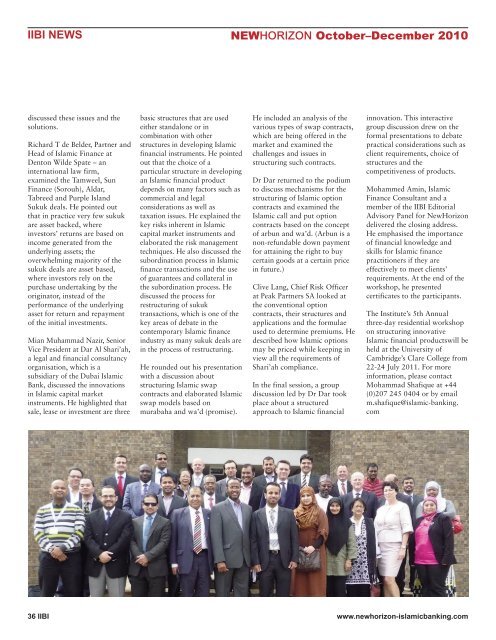NEWHORIZON
NEWHORIZON - Institute of Islamic Banking and Insurance
NEWHORIZON - Institute of Islamic Banking and Insurance
- No tags were found...
You also want an ePaper? Increase the reach of your titles
YUMPU automatically turns print PDFs into web optimized ePapers that Google loves.
IIBI NEWS<br />
<strong>NEWHORIZON</strong> October–December 2010<br />
discussed these issues and the<br />
solutions.<br />
Richard T de Belder, Partner and<br />
Head of Islamic Finance at<br />
Denton Wilde Spate – an<br />
international law firm,<br />
examined the Tamweel, Sun<br />
Finance (Sorouh), Aldar,<br />
Tabreed and Purple Island<br />
Sukuk deals. He pointed out<br />
that in practice very few sukuk<br />
are asset backed, where<br />
investors’ returns are based on<br />
income generated from the<br />
underlying assets; the<br />
overwhelming majority of the<br />
sukuk deals are asset based,<br />
where investors rely on the<br />
purchase undertaking by the<br />
originator, instead of the<br />
performance of the underlying<br />
asset for return and repayment<br />
of the initial investments.<br />
Mian Muhammad Nazir, Senior<br />
Vice President at Dar Al Shari’ah,<br />
a legal and financial consultancy<br />
organisation, which is a<br />
subsidiary of the Dubai Islamic<br />
Bank, discussed the innovations<br />
in Islamic capital market<br />
instruments. He highlighted that<br />
sale, lease or investment are three<br />
basic structures that are used<br />
either standalone or in<br />
combination with other<br />
structures in developing Islamic<br />
financial instruments. He pointed<br />
out that the choice of a<br />
particular structure in developing<br />
an Islamic financial product<br />
depends on many factors such as<br />
commercial and legal<br />
considerations as well as<br />
taxation issues. He explained the<br />
key risks inherent in Islamic<br />
capital market instruments and<br />
elaborated the risk management<br />
techniques. He also discussed the<br />
subordination process in Islamic<br />
finance transactions and the use<br />
of guarantees and collateral in<br />
the subordination process. He<br />
discussed the process for<br />
restructuring of sukuk<br />
transactions, which is one of the<br />
key areas of debate in the<br />
contemporary Islamic finance<br />
industry as many sukuk deals are<br />
in the process of restructuring.<br />
He rounded out his presentation<br />
with a discussion about<br />
structuring Islamic swap<br />
contracts and elaborated Islamic<br />
swap models based on<br />
murabaha and wa’d (promise).<br />
He included an analysis of the<br />
various types of swap contracts,<br />
which are being offered in the<br />
market and examined the<br />
challenges and issues in<br />
structuring such contracts.<br />
Dr Dar returned to the podium<br />
to discuss mechanisms for the<br />
structuring of Islamic option<br />
contracts and examined the<br />
Islamic call and put option<br />
contracts based on the concept<br />
of arbun and wa’d. (Arbun is a<br />
non-refundable down payment<br />
for attaining the right to buy<br />
certain goods at a certain price<br />
in future.)<br />
Clive Lang, Chief Risk Officer<br />
at Peak Partners SA looked at<br />
the conventional option<br />
contracts, their structures and<br />
applications and the formulae<br />
used to determine premiums. He<br />
described how Islamic options<br />
may be priced while keeping in<br />
view all the requirements of<br />
Shari’ah compliance.<br />
In the final session, a group<br />
discussion led by Dr Dar took<br />
place about a structured<br />
approach to Islamic financial<br />
innovation. This interactive<br />
group discussion drew on the<br />
formal presentations to debate<br />
practical considerations such as<br />
client requirements, choice of<br />
structures and the<br />
competitiveness of products.<br />
Mohammed Amin, Islamic<br />
Finance Consultant and a<br />
member of the IIBI Editorial<br />
Advisory Panel for NewHorizon<br />
delivered the closing address.<br />
He emphasised the importance<br />
of financial knowledge and<br />
skills for Islamic finance<br />
practitioners if they are<br />
effectively to meet clients’<br />
requirements. At the end of the<br />
workshop, he presented<br />
certificates to the participants.<br />
The Institute’s 5th Annual<br />
three-day residential workshop<br />
on structuring innovative<br />
Islamic financial productswill be<br />
held at the University of<br />
Cambridge’s Clare College from<br />
22-24 July 2011. For more<br />
information, please contact<br />
Mohammad Shafique at +44<br />
(0)207 245 0404 or by email<br />
m.shafique@islamic-banking.<br />
com<br />
36 IIBI www.newhorizon-islamicbanking.com
















